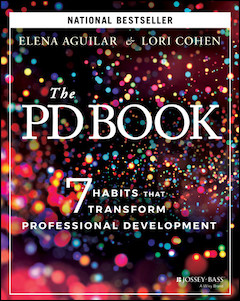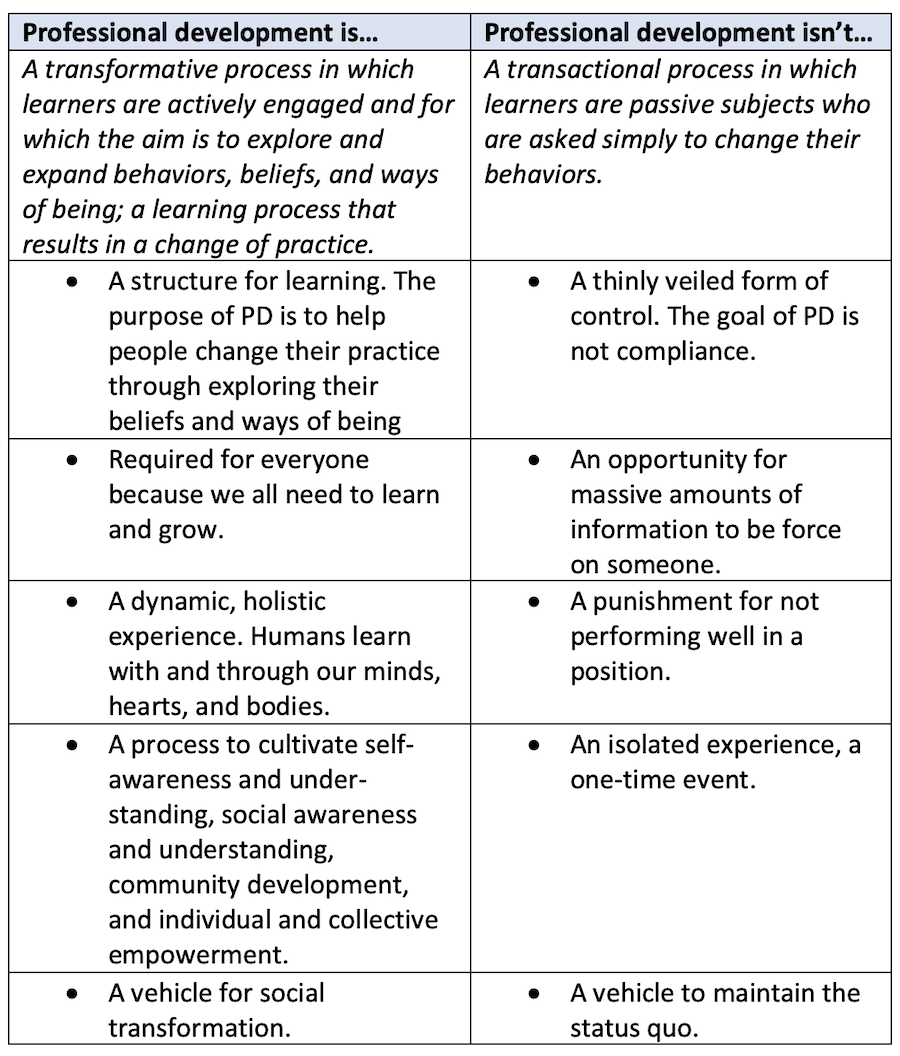
The PD Book: 7 Habits that Transform Professional Development
By Elena Aguilar and Lori Cohen
(Wiley/Jossey-Bass, 2022 – Learn more)
Reviewed by Cathy Gassenheimer
 Imagine for a moment that you are in your eighth or ninth year of teaching and your principal asks you to be responsible for the school’s professional learning for the year. A stipend is attached, and you’ll be given time to prepare.
Imagine for a moment that you are in your eighth or ninth year of teaching and your principal asks you to be responsible for the school’s professional learning for the year. A stipend is attached, and you’ll be given time to prepare.
You decide to take on the challenge, and you learn that the principal hopes you’ll lead an introductory session for faculty members in two weeks. What resources could you call upon to help ensure you’ll do a good job?
One such recent resource is The PD Book: 7 Habits That Transform Professional Development, by Elena Aguilar and Lori Cohen (Wiley, 2022).
 Aguilar is a former teacher and instructional coach who now leads Bright Morning Consulting. Cohen is also a former teacher and coach and now a professional development designer who works with Bright Morning.
Aguilar is a former teacher and instructional coach who now leads Bright Morning Consulting. Cohen is also a former teacher and coach and now a professional development designer who works with Bright Morning.
The duo bring their combined knowledge and experience to this book and provide practical suggestions, scenarios, and artifacts to help those who develop and lead professional learning hone their trade.
Engaging and Practical
The book is inviting, engaging, and practical. Its introduction and seven chapters are chock-full of suggestions and tools that can be put to immediate use. This link will take you to the Table of Contents, which provides a brief but thorough overview of each chapter.
Some of the resources in the book include:
- A chart describing what professional development is and what it isn’t (see below);
- Principles of transformative professional development;
- How to address conflict before, during, or after professional development;
- Resistance: its cause and how to address it;
- Checklists and specific suggestions about how to design, prepare for, and facilitate professional development.
What PD Is and Isn’t

Scenarios Abound
Each chapter of the book begins with a scenario related to that specific chapter’s focus. The scenarios are realistic and grab the readers’ attention. In fact, as a professional learning provider, I’ve experienced similar challenges over the years.
As an example, one scenario underscores the importance of being prepared and making participants feel welcomed even before the learning begins. The scenario describes a first-year teacher preparing to attend his first professional learning event. The day before the event he receives an email advising of a change of location. He arrives and can’t find the room due to a lack of signage.
Once he finds the room, it is clear the people involved in the event are ill-prepared: his name is misspelled on his name tag, the learning packet has visible mistakes, and the technology is not yet ready. Finally, right before the session is supposed to begin, an announcement is made that due to technical problems and the change of location, the session will be delayed for 30 minutes. Not an promising start!
This scenario underscores the importance of preparation and the ability to troubleshoot. Each one of the problems is addressed, mostly by advanced planning. Checklists accompany the suggestions to ensure facilitators avoid the challenges detailed above.
21 Planning Questions That Will Make Your PD Awesome
Another very useful tool in the book are the 21 planning questions organized by purpose, intended outcomes, audience and context, topics, structures/activities, and measuring learning. Questions range from “What is the purpose of this session?” to “How will you create an environment in which adults feel psychologically safe and challenged to grow?”
The authors also suggest a technique I learned from Bruce Wellman and Laura Lipton, two veteran, highly skilled facilitators. They suggest that when introducing a learning activity, participants should be clearly informed of its purpose…e.g., “The Why.” Aguilar and Cohen agree and provide examples of an introductory document they title The What-Why-How Agenda.
Citations and Concerns
While I recommend this book as a very useful tool for anyone involved in professional learning, reading the book raised two concerns. My first concern relates to the title of the book and the usage of “professional development” rather than “professional learning.” While the authors note that professional development is not just an event in time, I believe it is critically important to use the term “professional learning.”
Oftentimes, the most effective professional learning can be a team of teachers planning lessons or evaluating student work. Too often, this important work is not considered to be “professional learning” when, in fact, it can be transformational for participating teachers.
The result? Schools spend allocated professional learning dollars on bringing in a noted “presenter” when often the money could be better spent on providing time and resources for teachers to plan and learn together, perhaps in partnership with an instructional coach.
My second concern relates to the limited number of professional learning experts that are cited in the book or in the references. For example, the chapter on adult learning strategies does not reference or mention Malcolm Knowles who is considered the “Father of Andragogy,” which is adult learning theory. His six core adult learning principles include:
- The learner’s need to know (why, what, how?)
- Self-concept of the learner (autonomous, self-directing)
- Prior experience of the learning (resource, mental models)
- Readiness to learn (life related, developmental task)
- Orientation to learning (problem centered, conceptual)
- Motivation to learn (intrinsic value, personal payoff)
Serious professional learning providers should read and study Knowles’ work, which is now in its eighth edition.
Useful Tool and Resource
Nonetheless, I’m glad I read this book. The checklists, scenarios, and tools are useful. And, for anyone tapped to become a professional learning provider – either internally or externally – this book will be a valuable resource and guide.
Cathy Gassenheimer is a professional learning consultant specializing in collaborative adult learning and collective efficacy. For 22 years she was Executive Vice President of the Alabama Best Practices Center, a program of Alabama’s statewide nonprofit A+ Education Partnership, and led the work of three statewide educator networks focused on teaching, leadership, and instructional coaching. Connect with her via LinkedIn and on Twitter @cathygassenheim.




